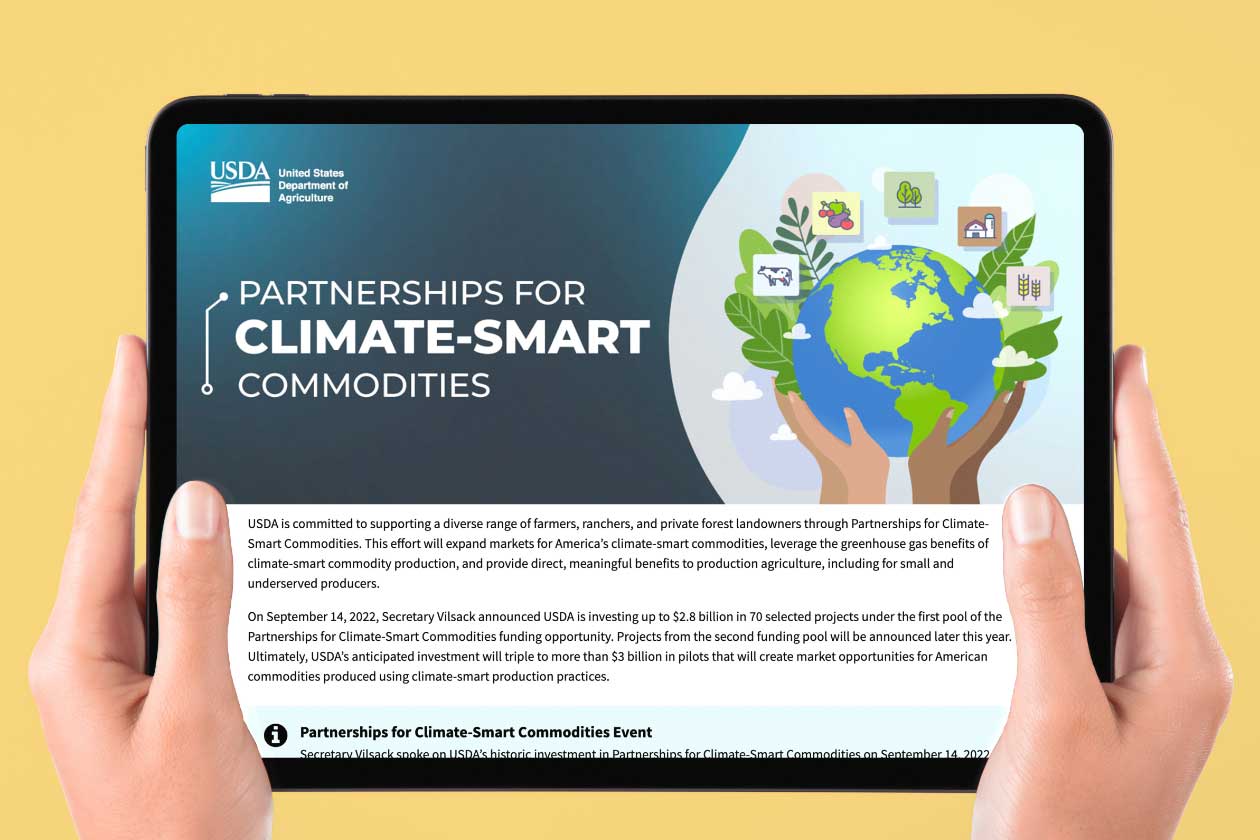September 14, 2022 may go down as one of the most important dates in the history of U.S. agriculture. Rank it right up there with the moldboard plow, hybrid corn and mapping the genome. That’s the day Secretary Vilsack announced that USDA was awarding $2.8 billion to 70 different projects as part of its Partnership for Climate-Smart Commodities program. This is the first round of funding–a second round should push the total investment to $3 billion and potentially beyond.
USDA has invested nearly $3 billion in climate-smart agricultural practices.
For several years, programs in the private sector have promoted food-chain-wide sustainable practices as a response to consumer-driven retail directives. A few verification processes have been put in place to validate the production practices, allowing retail brands to establish a point of differentiation on grocery shelves. In most instances, these are market-driven programs with little public intervention. When USDA made the commitment to invest nearly $2.8 billion into climate-smart agriculture, it jumped into the sustainability market in a big way.
When USDA made the commitment to invest nearly $2.8 billion into climate-smart agriculture, it jumped into the sustainability market in a big way.
In the announcement, Secretary Vilsack laid out the two-pronged approach that is the basis of the program: be the leader in climate-smart agricultural production and grow the market for those products. By doing this, USDA is taking a page from the private sector playbook: use and validate climate-smart practices to differentiate products from competitors.

Except the competitors aren’t two companies vying for the U.S. consumer pocketbook. For a long time, U.S. agriculture has relied on export markets to soak up excess supply and buoy American commodity markets. So the competition is with other countries in the acquisition of a larger share of the global food market.
The Climate-Smart program will establish American agriculture as the world leader in the development of climate-friendly products.
One of the organizations receiving a grant is Edge Dairy Farmer Cooperative, a Wisconsin-based verification cooperative for dairy farmers that also provides representation on federal policies that affect its members. Their sister organization, Farmers for Sustainable Food (FSF), promotes and supports farmer-led solutions to environmental challenges that create long-term, sustainable prosperity throughout the food system. The funded project will continue work by FSF to identify and validate the sustainable practices farmers are implementing to produce food. The group partners with corporate participants to establish baseline practices and document progress toward a goal. A scorecard helps leverage good practices within a producer’s chosen processing facility and ultimately with end users.
“With the climate-smart program, we can build off best practices already established on farms, where sustainability starts, and document the progress from the farm ultimately to consumers,” says Tim Trotter, CEO of Edge. Funds from the program will help grow the program and scale it across the upper Midwest. “Our goal is to help farmers leverage their data in the marketplace so they can benefit not only with a more sustainable environment but from a stronger market for their products.”
The model adopted by FSF is one that, when extended across all of the projects funded by the Partnership program, could be a watershed moment for American agriculture.

“The Climate-Smart program will establish American agriculture as the world leader in the development of climate-friendly products,” says Trotter. “What’s more, we’ll have the data to prove it, creating a substantial advantage on the global food market.”
The beauty of the program is that the American farmer stands to benefit the most. For generations, farmers have implemented climate-smart production practices. Projects funded through the program will help validate the great work farmers are already doing and encourage and reward continuous improvement. The end result is a more robust market for U.S. agricultural products, a more robust economy for American farmers and a better climate for everyone.
C.O.nxt Insights
Our team of subject matter experts focuses on food and agriculture—farm field to processing to entrée on a plate. We can help you build a new brand, protect an old one or target customers to foster sales. Let’s talk when the time is right to handle your next strategic marketing and communications challenge: Marcy Tessmann, marcy@co-nxt.com.
C.O.nxt Insight.
Our team of subject matter experts focuses on food and agriculture—farm field to processing to entrée on a plate. We can help you build a new brand, protect an old one or target customers to foster sales. Let’s talk when the time is right to handle your next strategic marketing and communications challenge: Marcy Tessmann, marcy@co-nxt.com.
SHARE THIS STORY
2026 Forecast for Marketers
The marketing landscape is shifting. Here are the top trends to watch in digital advertising, media and AI.
